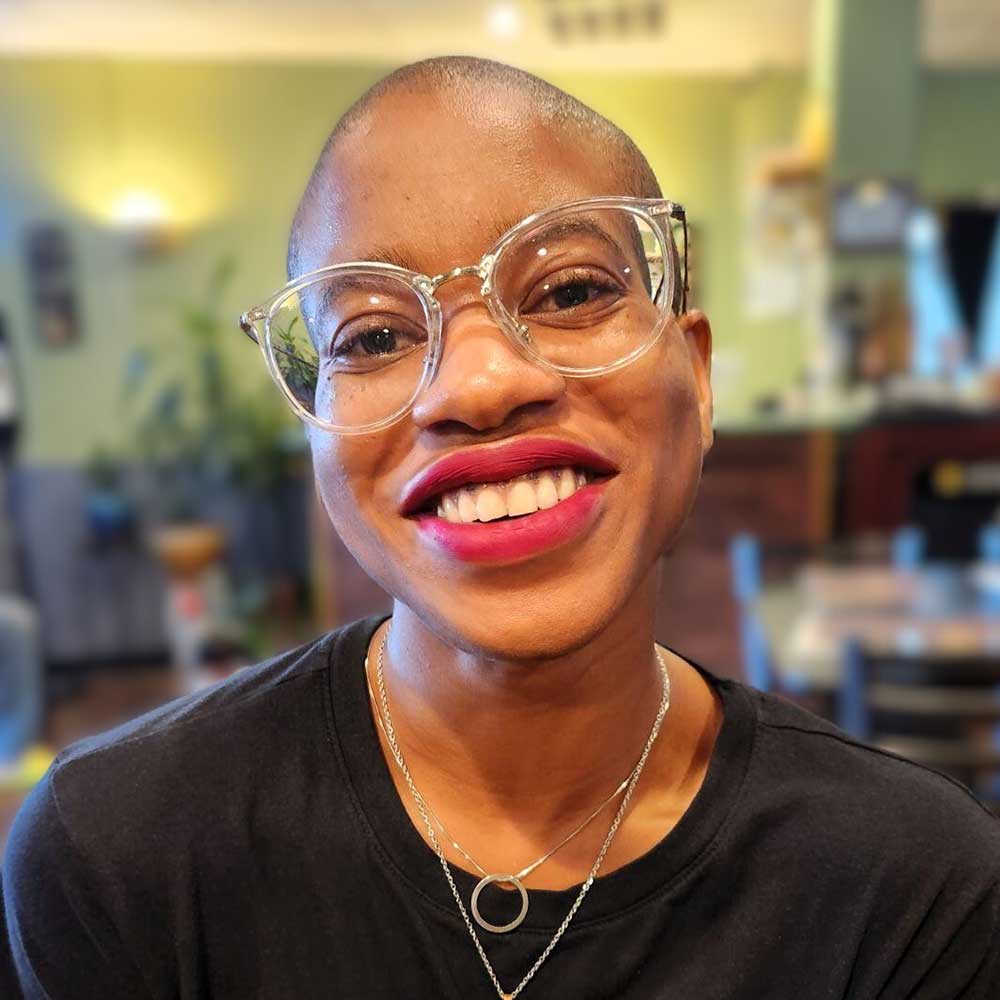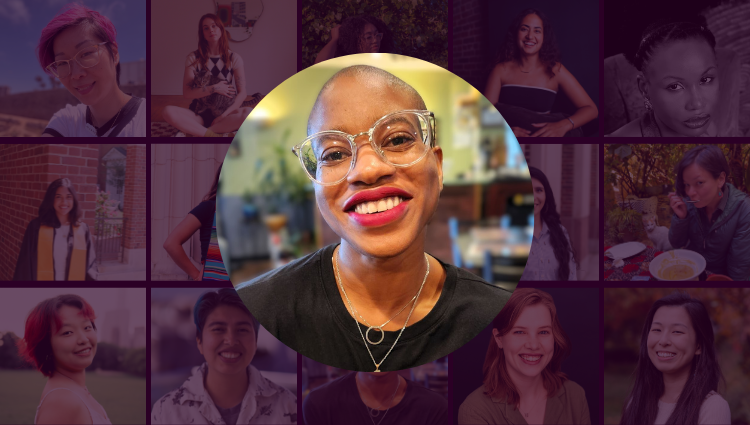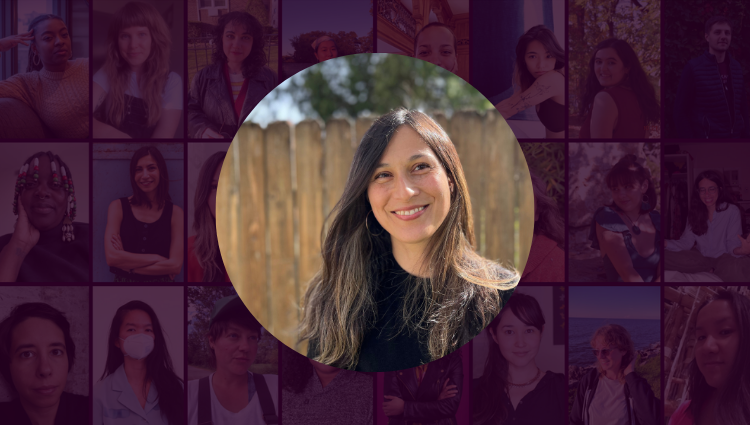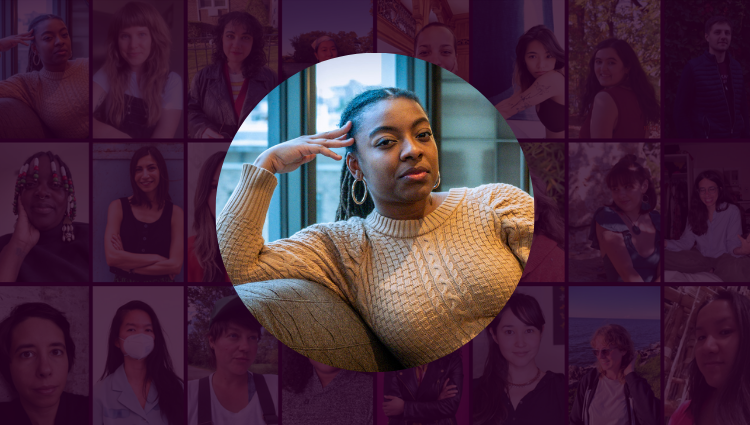Winita Frederick was one of our 2024 Digital Residents. As a part of this program, we do Q&As with our residents to feature them, their work, and their words. See our Q&A with Winita below, and explore more Spotlights here.
TSW: Tell us about your work, writing, or project. What are you writing these days? How is your work changing, and how is it changing you?
Winita Frederick: I’m writing and making things constantly, but my primary work lately has been the practice of friendship. I read The Vertical Interrogation of Strangers by Bhanu Kapil after it was recommended in the residency session. One of the questions the book is shaped around is “How will you / have you prepare(d) for your death?” My answer to that question when it was used as a prompt in one of our sessions was “friendship.” Just being with my friends, exchanging poems and short stories with them, plus reading / listening to / watching their recommendations and rough drafts has kept me really excited about making things.
TSW: What were you processing during our residency program? Did anything unlock for you? If so, what new entrance did you find for your work or for yourself as a writer in the world? And what caused that shift?
WF: For a long time I had a lot of shame around my creative aspirations. I didn’t grow up knowing anyone who had a creative vocation or who even really liked their job. Without going into therapy territory, I’ll just say that I had a core wound around believing that it wasn’t safe for me to be proud of myself and the things that I am inherently good at (i.e.: being attentive and curious about the world and using language and literature as a primary way of finding sense in it). Because of this wound, whenever I’d previously tried to pursue this craft in earnest, I was doing it from a really insecure place and wanting other people who I admired to tell me that I / my writing was good enough. Throughout the residency, I was able to process a lot of those old stories I’d been telling myself.
Because I didn’t grow up seeing the different ways someone could sustain themself doing creative work that they enjoy, I thought my only option was to write The Next Great Pulitzer Prize-Winning American Novel™. If I didn’t, then I’d be a failure. That is obviously a lot of pressure to put on one’s self.
Being in a group with artists in various stages of their careers and spending time with the recommended reading materials — written by writers in different stages of their careers — helped me put my aspirations (and perceived limitations) into perspective. Once I stopped externalizing my need to have my aspirations validated, I could put all of that energy back into the work. When I made that shift, the work started to become so much more honest and structurally sound!
TSW: What’s a mantra or motto that you have in mind these days when you are writing or creating? Is there a writing routine or ritual that keeps you beginning?
WF: There’s a Maya Angelou quote I’ve always loved: “You can’t use up creativity. The more you use, the more you have.” Sometimes I can get into a funk when I don’t feel like I’m writing anything good (a funk can literally be like two days), but then something meaningful always surfaces as inspiration soon enough.
As far as a routine goes, Google Docs is like my most used app on my phone right now, and I tend to write one stanza or paragraph at a time on my phone throughout the day. So I try to wake up early and read for 30 minutes to two hours most mornings before I do anything else that involves the outside world. Then when I’m running errands, waiting for water to boil etc, I write. This seems to be a really good setup for this time of my life.
After Diane di Prima died a few years ago, a piece about her in the New York Times mentioned that she got into writing “modular poems” when she became a mother. Later she stated, “The requirements of our life is the form of art.” I’m big on working with the tools one has available to them and not waiting for the ideal writing or music recording software, MFA program, lifestyle etc to get started.
On days when my brain is too overloaded to maintain my reading and writing habits, I swap my morning reading for journaling or meditation. Mostly I try to stay away from instagram until after 12 pm. If I start my day with it, I am distracted the rest of the day.
Another motto that guides me, although it’s mostly a joke: “Just chip away the stone that doesn’t look like David.” Getting comfortable just writing in the voice in which I talk really helped me get closer to shaping things closer to how I sense them when they’re just in my imagination.
TSW: What motivates you to keep beginning, and/or, what is a story that gave you permission to tell yours? Feel free to tell us what’s on your bookshelf or TBR list these days.
WF: In 2024, I Always Knew by Barbara Chase-Riboud; Speak Okinawa by Elizabeth Miki Brina; Martyr! By Kaveh Akbar; Body Work by Melissa Febos; The Chosen Place, The Timeless People by Paule Marshall; The Vertical Interrogation of Strangers by Bhanu Kapil; A Small Place by Jamaica Kincaid
TSW: What is something that someone said — a fellow resident, a past mentor, perhaps something from one of the bonus sessions — that helped change the way you see your writing or work?
WF: One question that really pushed me to be braver in my writing was the following question read by Joyce during one of the earlier residency sessions: If your work is not being changed by the world, how do you expect the world to be changed by your work? Earlier in the year, I’d mostly been writing about birds, which is not a bad thing, but it was definitely symptomatic of a pattern of avoidance. I just wasn’t ready to write responsibly about more exigent topics. But if I really wanted to commit to the discipline of crafting something impactful with the tool of language and the material of my life, then I needed to bring more of the world into my work.




